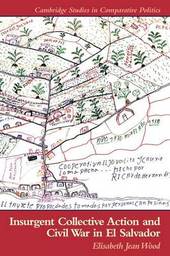
|
Insurgent Collective Action and Civil War in El Salvador
Paperback / softback
Main Details
| Title |
Insurgent Collective Action and Civil War in El Salvador
|
| Authors and Contributors |
By (author) Elisabeth Jean Wood
|
| Series | Cambridge Studies in Comparative Politics |
|---|
| Physical Properties |
| Format:Paperback / softback | | Pages:332 | | Dimensions(mm): Height 229,Width 152 |
|
| Category/Genre | Military history |
|---|
| ISBN/Barcode |
9780521010504
|
| Classifications | Dewey:972.84053 |
|---|
| Audience | | Professional & Vocational | |
|---|
| Illustrations |
1 Tables, unspecified; 17 Maps; 10 Halftones, unspecified; 11 Line drawings, unspecified
|
|
Publishing Details |
| Publisher |
Cambridge University Press
|
| Imprint |
Cambridge University Press
|
| Publication Date |
4 August 2003 |
| Publication Country |
United Kingdom
|
Description
Widespread support among rural people for the leftist insurgency during the civil war in El Salvador challenges conventional interpretations of collective action. Those who supplied tortillas, information, and other aid to guerillas took mortal risks and yet stood to gain no more than those who did not. Wood's rich tapestry of explanation is based on oral histories gathered from peasants who supported the insurgency and those who did not over a period of many years during and immediately following the war, and interviews with military commanders of both sides. Peasants supported the FMLN, Wood found, not for any material gain that was contingent on their participation, but rather for moral and emotional reasons. Wood's alternative model places emotions and morals, as well as conventional interests, at the heart of collective action.
Reviews'Elisabeth Jean Wood's Insurgent Collective Action and Civil War in El Salvador is a scholastic tour de force that can, on the one hand, be described as the latest addition to that canon of classic works seeking to explain peasant insurgency, while on the other as offering a radical and novel account of campesino motivations ... detailed and comprehensive ... novel and innovative ... Her conclusions open a new chapter in the study of peasant rebellion.' Latin American Review of Books
|